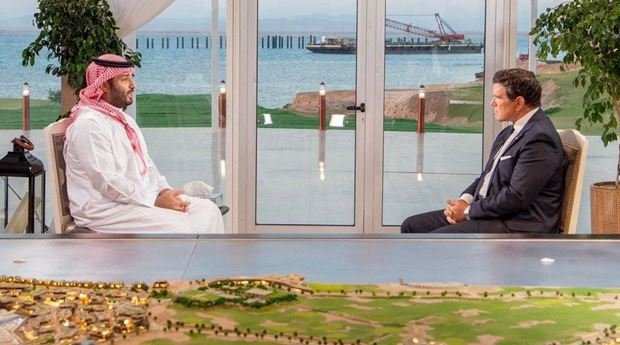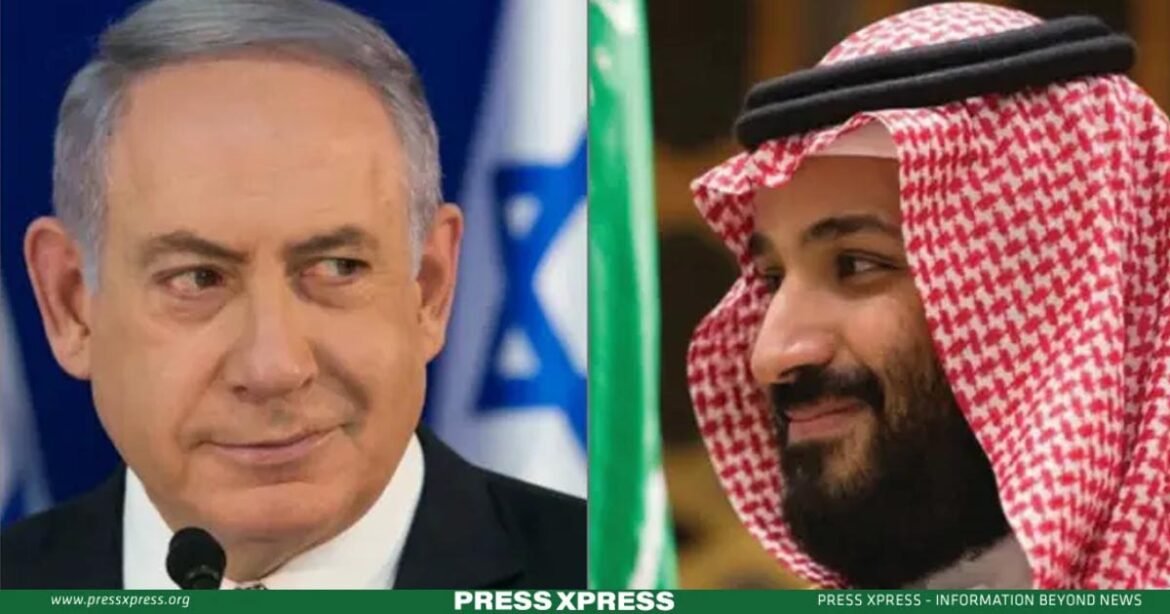When asked about the consequences of Iran obtaining a nuclear bomb, MBS stated, “If they possess one, we would be compelled to acquire one as well.”
Saudi Arabia’s Crown Prince Mohammed bin Salman (MBS) publicly acknowledged for the first time that his country is moving closer each day to a normalization agreement with Israel. “Every day, we get closer [to an agreement]. it seems it’s the first time this one is serious. We’re going to see how it goes (…)”, he noted. The 38-year-old crown prince continued by saying “If the Biden administration succeeds, it would mark the most significant historical deal since the Cold War.”
You can also read: Is Saudi-Iran collaboration a setback for Israel and US?
The normalization talks serve as the focal point in intricate negotiations, encompassing potential Israeli concessions to the Palestinians, alongside deliberations on US security assurances and Riyadh’s requests for civilian nuclear assistance. These negotiations involve a multifaceted web of diplomatic efforts and interests.
Palestinian Issue Remains Crucial
Muhammad Bin Salman, also known as the MBS stressed “The Palestinian issue was still a ‘very important’ part of the US-brokered talks. MBS continued by saying, “Our aspiration is for the negotiations to lead to a situation where the Palestinians’ lives are improved, while also positioning Israel as a key player in the Middle East.”
The youthful monarch declined to delve into the details of Saudi Arabia’s demands on the issue. He preferred to focus on addressing “needs” instead of tying recognition of Israel to the establishment of a Palestinian state, as outlined in the 2002 Arab Peace Initiative crafted by the late Crown Prince Abdullah—a blueprint still officially upheld by the kingdom.
Concerns Over Iran’s Nuclear Ambitions
During the negotiation phase, Israeli and US officials were reported to be collaborating on a potential strategy that might lead to Riyadh openly engaging in uranium enrichment. Enriched uranium has applications in the production of both nuclear reactor fuel and potentially nuclear weapons. There has been no public reaction from the office of Israeli Prime Minister Benjamin Netanyahu in response to the article, even though he has previously warned about the dangers of a nuclear arms race in the Middle East.

MBS also expressed apprehension regarding the prospect of Iran, a common adversary of Saudi Arabia and Israel, potentially acquiring a nuclear weapon. Tehran has consistently denied any pursuit of nuclear armament. He remarked, “That would be a detrimental course of action. If it were to happen, it would lead to significant global confrontations.” When asked about the consequences of Iran obtaining a nuclear bomb, MBS stated, “If they possess one, we would be compelled to acquire one as well.”
While U.S. officials maintain that any significant breakthrough remains distant and significant challenges persist, they privately highlight the potential advantages of a comprehensive regional agreement.
Two-State Solution and Opposition
Prince Mohammed addressed questions about his willingness to work with the hardline government of Mr. Netanyahu during his interview, stating, “If we can reach an agreement that addresses Palestinian needs and promotes regional stability, we must cooperate with the existing leadership.”
Many individuals in Israel’s current ruling coalition firmly resist the internationally sanctioned idea of a two-state resolution for the Israel-Palestinian conflict. This approach entails the creation of an independent Palestinian state alongside Israel, with territorial inclusion in the West Bank and Gaza Strip, and its capital located in East Jerusalem.
In anticipation of the prime minister’s discussions in New York, 11 members of his own right-wing Likud party issued a joint declaration, affirming their commitment to obstruct any plans involving the transfer of land to the Palestinians as part of a peace deal with Saudi Arabia.
China’s Strategic Inroads in Saudi Arabia
The broadcast of the crown prince’s comments was strategically set for the same day as President Biden’s meeting with Israeli Prime Minister Benjamin Netanyahu. During this meeting, the leaders affirmed their shared objective of working together to achieve Israeli-Saudi normalization, a transformation with the potential to redefine the geopolitics of the Middle East.
By addressing these issues, we can eliminate a potential source of tension in the Arab-Israeli conflict, fortify our defenses against Iran, and counter China’s growing influence in the Gulf. President Biden could also chalk up a foreign policy success by achieving these goals as he seeks re-election in November 2024.
Washington is becoming increasingly alarmed about China’s endeavors to secure a strategic foothold in Saudi Arabia, the top global oil exporter.
Challenges and Controversies in Strengthening Ties
Despite the previous agreement reached in March during Chinese-mediated negotiations to mend relations between the two nations, MBS issued a stern warning to Tehran. While striving to negotiate a comprehensive agreement, the United States encounters the formidable challenge of meeting MBS’s demands, which reportedly include a treaty obligating the U.S. to come to the kingdom’s defense in case of an attack. Additionally, he is seeking advanced weaponry and support for a civilian nuclear program.
MBS is actively pursuing concessions from Israel to aid in preserving the prospects of statehood for Palestinians in the occupied territories. This aligns with President Biden’s objectives, even though Netanyahu’s far-right government has displayed limited willingness to grant such concessions.
Saudi Arabia’s Demands in Exchange for Normalization
Starting from late last year, the United States has been striving to achieve a breakthrough that would extend the progress made under the Abraham Accords brokered by the Trump administration. These accords resulted in Israel signing bilateral normalization agreements with the United Arab Emirates and Bahrain in 2020.
As part of their bid to normalize ties with Israel, Saudi Arabia, asserting its leadership in the Middle East and the Islamic world, is requesting substantial military assistance from the U.S. They want collaboration in developing its civilian nuclear program, and notable concessions from Israel in favor of the Palestinians.
In the intricate web of Middle East diplomacy, the meeting between Joe Biden and Benjamin Netanyahu, and the subsequent support expressed by Saudi Crown Prince Mohammed bin Salman, signal the potential for a historic breakthrough. With the prospect of normalization agreements looming, the region faces challenges, from addressing the Palestinian issue to countering Iran’s nuclear ambitions. However, the road ahead is fraught with challenges, controversies, and complex demands, underscoring the delicate balance required to achieve lasting peace and stability in the region.


